- Home
- Kate Quinn
The Huntress Page 4
The Huntress Read online
Page 4
“This way.” Ian motioned her toward his door, keeping a wary eye on the razor. Rarely did visitors enter quite this dramatically. “You have business with the Refugee Documentation Center, Fräulein?”
The woman folded up that lethally sharp razor and tucked it back into her boot. “Arrived an hour less ago,” she said in hodgepodge English as Ian closed the office door. Her accent was strange, somewhere between English and something farther east than Vienna. It wasn’t until she straightened and brushed her tangled hair from a pair of bright blue eyes that Ian’s heart started to pound.
“Still don’t know me from Tom, Dick, or Ivan?” she asked.
Bloody hell, Ian thought, frozen. She’s changed.
Five years ago she’d lain half starved in a Red Cross hospital bed, all brittle silence and big blue eyes. Now she looked capable and compact in scuffed trousers and knee boots, swinging a disreputable-looking sealskin cap in one hand. The hair he remembered as dull brown was bright blond with dark roots, and her eyes had a cheery, wicked glitter.
Ian forced the words through numb lips. “Hello, Nina.”
Tony came banging back in. “The gnädige Frau’s feathers are duly smoothed down.” He gave Nina a rather appreciative glance. “Who’s our visitor?”
She looked annoyed. “I sent a letter. You didn’t get?” Her English has improved, Ian thought. Five years ago they’d barely been able to converse; she spoke almost no English and he almost no Polish. Their communication in between then and now had been strictly by telegram. His heart was still thudding. This was Nina . . . ?
“So you’re—” Tony looked puzzled, doubtless thinking of Ian’s description of a woman who needed gentle handling. “You aren’t quite what I was expecting, Miss Markova.”
“Not Miss Markova.” Ian raked a hand through his hair, wishing he’d explained it all four days ago, wishing he hadn’t had the impulse to turn the tables on his partner. Because if anyone in this room had had the tables turned on them, it was Ian. Bloody hell. “The file still lists her birth name. Tony Rodomovsky, allow me to introduce Nina Graham.” The woman in the hospital bed, the woman who had seen die Jägerin face-to-face and lived, the woman now standing in the same room with him for the first time in five years, a razor in her boot and a cool smile on her lips. “My wife.”
Chapter 3
Nina
Before the war
Lake Baikal, Siberia
She was born of lake water and madness.
To have the lake in her blood, that was to be expected. They all did, anyone born on the shore of Baikal, the vast rift lake at the eastern edge of the world. Any baby who came into the world beside that huge lake lying like a second sky across the taiga knew the iron tang of lake water before they ever knew the taste of mother’s milk. But Nina Borisovna Markova’s blood was banded with madness, like the deep striations of winter lake ice. Because the Markovs were all madmen, everyone knew that—every one of them swaggering and wild-eyed and savage as wolverines.
“I breed lunatics,” Nina’s father said when he was deep into the vodka he brewed in his hunting shack behind the house. “My sons are all criminals and my daughters are all whores—” and he’d lay about him with huge grimed fists, and his children hissed and darted out of the way like sharp-clawed little animals, and Nina might get an extra clout because she was the only tiny blue-eyed one in a litter of tall dark-eyed sisters and taller dark-eyed brothers. Her father’s gaze narrowed whenever he looked at her. “Your mother was a rusalka,” he’d growl, huddled in his shirt half covered by a clotted black beard.
“What’s a rusalka?” Nina finally asked at ten.
“A lake witch who comes to shore trailing her long green hair, luring men to their deaths,” her father replied, dealing a blow Nina ducked with liquid speed. It was the first thing a Markov child learned, to duck. Then you learned to steal, scrabbling for your own portion of watery borscht and hard bread, because no one shared, not ever. Then you learned to fight—when the other village boys were learning to net fish and hunt seals, and the girls were learning to cook and mend fishing nets, the Markov boys learned to fight and drink, and the Markova girls learned to fight and screw. That led to the last thing they learned, which was to leave.
“Get a man who will take you away,” Nina’s next-oldest sister told her. Olga was gathering her clothes: fifteen, her body rounding, eyes already trained west in the direction of Irkutsk, the nearest city, hours away beyond the Siberian horizon. Nina couldn’t imagine what a city looked like. All she’d ever seen was the collection of ramshackle huts that could barely be called a village; fishing boats silvery and pungent with fish scales; the endless spread of the lake. “Get a man,” Olga repeated, “because that’s the only way you’ll get out.”
“I’ll find a different way,” Nina said. Olga gave her a spiteful scratch in farewell and was gone. None of Nina’s siblings ever came back; it was everyone for themselves, and she didn’t miss them until the last brother left, and it was just her and her father. “Little rusalka bitch”—he slung Nina around the hut as she hissed and scratched at the huge hand tangled in her wild hair—“I should give you back to the lake.” He didn’t frighten Nina much. Weren’t all fathers like hers? He loomed as large in her world as the lake. In a way, he was the lake. The villagers sometimes called the lake “the Old Man.” One Old Man stretched blue and rippling on the doorstep, and the other old man banged her around the hut.
He wasn’t always wild. In mellow moods he sang old songs of Father Frost and Baba Yaga, stropping the straight razor that always swung at his belt. In those moods he’d show Nina how to tan a pelt from the seals he shot with the ancient rifle over the door; took her hunting with him and taught her how to move over the snow in perfect silence. Then he didn’t call her a rusalka; he tugged her ear and called her a little huntress. “If I teach you anything,” he whispered, “let it be how to move through the world without making a sound, Nina Borisovna. If they can’t hear you coming, they’ll never lay hands on you. They haven’t caught me yet.”
“Who, Papa?”
“Stalin’s men,” he spat. “The ones who stand you against a wall and shoot you for saying the truth—that Comrade Stalin is a lying, murdering pig who shits on the common man. They kill you for saying things like that, but only if they can find you. So keep silent feet and they’ll never hunt you down. You’ll hunt them down instead.”
He’d go on like that for hours, until Nina dozed off. Comrade Stalin is a Georgian swine, Comrade Stalin is a murdering sack of shit. “Stop him saying those things,” the old women who bartered clothes whispered to Nina when she came to trade. “We’re not so far out on the edge of the world that the wrong ears can’t hear us. That father of yours will get himself shot, and his neighbors.”
“He says the tsar was a murdering sack of shit too,” Nina pointed out. “And Jews, and the natives, and any seal hunters who leave carcasses on our section of shore. He thinks everything and everyone is shit.”
“It’s different to say it about Comrade Stalin!”
Nina shrugged. She wasn’t afraid of anything. It was another curse in the Markov family; none of them feared blood or darkness or even the legend of Baba Yaga hiding in the trees. “Baba Yaga is afraid of me,” Nina said to another village child when they were scrapping ferociously over a broken doll. “You’d better be afraid of me too.” She got the doll, thrust at her by the child’s mother who crossed herself in the old way, the way the people did before they learned that religion was the opiate of the masses.
“Fearlessness, heh,” Nina’s father said when he heard. “It’s why my children will all die before me. You fear nothing, you get stupid. It’s better to fear one thing, Nina Borisovna. Put all the terror into that, and it leaves you just careful enough.”
Nina looked at her father wonderingly. He was so enormous, wild as a wolf; she could not imagine him afraid of anything. “What’s your fear, Papa?”
He put his lips to her e
ar. “Comrade Stalin. Why else live on a lake the size of the sea, as far east in the world as you can go before falling off?”
“What’s as far west as you can go before falling off?” The sun went west to die, and most of the world was west of here, but beyond that Nina hardly knew. There was only one schoolmaster in the village, and he was almost as ignorant as the children he taught. “What’s all the way west?”
“America?” Nina’s father shrugged. “Godless devils. Worse than Stalin. Stay clear of Americans.”
“They’ll never catch me.” Tapping her toes. “Silent feet.”
He toasted that with a swallow of vodka and one of his rare knife-edged smiles. A good day. His good days always came back to bad ones, but that never bothered her because she was fast and silent and feared nothing, and she could always keep out of reach.
Until the day she turned sixteen, when her father tried to drown her in the lake.
Nina was standing on the shore in a pure, cold twilight. The lake was frozen in a sheet of dark green glass, so clear you could see the bottom far below. When the surface ice warmed during the day, crevasses would open, crackling and booming as if the lake’s rusalki were fighting a war in the depths. Close to shore, hummocks of turquoise-colored ice heaved up over each other in blocks taller than Nina, shoved onto the bank by the winter wind. A few years ago, those frozen waves had crawled so far ashore that Tankhoy Station had been entirely swallowed in wind-flung blue ice. Nina stood in her shabby winter coat, hands thrust into her pockets, wondering if she would still be here to see the lake freeze next year. She was sixteen years old; all her sisters had left home before they reached that age, mostly with swelling bellies. All the same, Markov’s daughters, came the whisper in the village. They all go bad.
“I don’t care if I go bad,” Nina said aloud. “I just don’t want a big belly.” But there didn’t seem to be anything else her father’s daughters did, except grow up, start breeding, and run away. Nina kicked restlessly at the shore, and her father came lurching out of the hut, naked to the waist, oblivious to the cold. Clumsy inked dragons and serpents writhed over his arms, and his body steamed. He’d been on one of his binges, guzzling vodka and muttering mad things for days, but now he seemed lucid again. He gazed at her, seeing her for the first time all day, and his eyes had an odd gleam. “The Old Man wants you back,” he said conversationally.
And he was after her like a wolf, though Nina got three sprinting strides toward the trees before the huge hand snatched at her hair and yanked her off her feet. She hit the ground so hard the world slipped sideways, and when it came to rights she was on her back, boots scrabbling on the ground as her father dragged her onto the glass-smooth lake.
The ice this time of year was thicker than a man was tall, but there were gaps where the ice thinned. The village schoolmaster, less ignorant about the lake than about most of the things he taught, said something about warmer water channels winding upward from the deeper rift, enough to make holes in the surface—and now, her father dragged her across the ice to one of the spring holes, dropped to his knees, broke the thin crust, and thrust her head under the freezing water.
Fear slapped Nina then, alien and spiky as new-forming frost. Even being dragged across the lake by the hair she had not been afraid; it had all happened too fast. But as the dark water swallowed her, terror descended like an avalanche. The water’s cold gripped her; she could see the depths of the lake stretching away below, blue green and fathomless, and she opened her mouth to scream but the lake’s iron fist punched into her mouth with another paralyzing burst of cold.
On the surface, her body thrashed against her father’s grip in her hair. His stone-hard hand thrust her head down deeper, deeper, but she flailed a leg free and slammed one boot into his ribs. He brought her up with a curse, and Nina got one sobbing gasp of air that stabbed her lungs like hot knives. Her father cursed blurrily; he released Nina’s sodden hair and flipped her onto her back, seizing her by the throat instead. “Go back to the lake,” he whispered, “go home.” Again her head went down under the water. This time she could see up through the ripples, up past her father to the twilight sky. Get there, she thought incoherently through another wash of fear, just get up there—and her hand stretched blindly . . . But it wasn’t the sky her fingers brushed. It was the unfolded razor swinging at her father’s belt.
She couldn’t feel her fingers wrapping around the handle. The cold had her in its jaws, clamping down. But she watched herself move through the ripples of the lake that was drowning her, watched her hand jerk the razor free and bring it around in a savage swipe across her father’s hand. Then he was gone, and Nina came roaring up out of the water, a shard of broken ice on the edge slicing along her throat, but she had the razor in her fist and she was free.
They lay gasping on opposite sides of the ice hole. Her father clutched his hand, which Nina had sliced nearly to the bone, sending curling ribbons of scarlet across the frozen lake. Nina huddled on her side, racked by bone-deep shudders of cold and terror, ice crystals already forming on her lashes and through her hair, a similar ribbon of blood winding down the side of her throat from the ice cut. She still held the razor extended toward her father.
“If you touch me again,” she said through chattering teeth, “I’ll kill you.”
“You’re a rusalka,” he mumbled, looking bewildered at her fury. “The lake won’t hurt you.”
A violent shudder racked her. I am no rusalka, she wanted to scream. I’ll die before I ever let water close over my head again. But all she said was, “I’ll kill you, Papa. Believe it.” And she managed to stumble back to the hut, where she bolted the door, peeled away her ice-crusted clothes, built up the fire, and crawled naked and shuddering under a pile of silver-gray seal pelts. Had it been deep winter the shock of the cold would have killed her, she realized later, but winter’s bite was easing toward spring, and she managed not to die. Her father slept it off in the hunting shack while Nina lay shivering under her furs, still gripping the razor, breaking into hiccuping little sobs whenever she thought of the water lapping over her face, filling her mouth and nose with its iron tang.
I have my one fear, she thought. From that day forward, as far as Nina Markova was concerned, if it wasn’t death by drowning it wasn’t worth being afraid of. Get away from here, she thought, unpeeling from the furs long enough to find her father’s vodka and take several enormous gulps of the oily, peppery stuff. Get out. The thought pounded. Go where? What is the opposite of a lake? What is the opposite of drowning? What lies all the way west? Nonsensical questions. Nina realized she was half drunk. She crawled under the furs again, slept like the dead, and woke with a crust of blood on her throat where the lake’s icy fingers had tried to kill her, and that one clear, cold thought.
Get out.
Chapter 4
Jordan
April 1946
Boston
Aaaaand it gets away! Line drive past the diving Johnny Pesky—”
“Garrett,” Jordan told her boyfriend as groans rose around them across the stands of Fenway Park, “I know the line drive got past Johnny Pesky. I’m right here, watching the line drive get past Johnny Pesky. You don’t need to give me the play-by-play.”
It was a perfect spring day: the smell of outfield grass, the murmur and rush of the crowd, the scratch of pencils on scorecards. Garrett grinned. “Admit it, you missed our baseball dates when I was in training. Even my play-by-play.” Jordan couldn’t resist raising the Leica for a snap. With his dimples, his broad shoulders, and his Red Sox cap tipped down over short brown hair, Garrett looked about as all-American cute as a Coca-Cola ad. Or a recruitment poster: he’d enlisted at the end of his senior year, giving Jordan his class ring, but a badly broken leg during pilot training and the abrupt end of the war with Japan not long afterward had cut his stint in the army air force very short. She knew Garrett regretted that—he’d been dreaming of dogfights over the Pacific when he signed up, not of being cut l
oose on a medical discharge before even making it overseas.
“Sure, I missed our baseball dates,” Jordan said playfully. “Maybe not as much as I missed having Ted Williams batting in the three-spot during the war, but—”
Garrett flicked a peanut shell into her ponytail. “Bet I looked better in an army air force uniform than Ted Williams.”
“I’m sure you did, because Ted Williams was a marine.”
“The marines were only invented so the army has someone to take to the prom.”
“I wouldn’t tell any marines that.”
“Too dumb to get the joke.”
The next Yankee came to bat, and Jordan raised the Leica. Only in the darkroom would she know if she missed the high point of the bat’s swing. Flawless timing; every great photographer needed it.
“Come to lunch this Sunday?” Garrett rooted through his bag of peanuts. “My parents are dying to see you.”
“Aren’t they hoping you’ll start dating some Boston University sorority girl in the fall?”
“Come on, you know they love you.”
They did, and so did Garrett, which surprised Jordan. They’d been together since she was a junior, and from the start she’d been determined not to get her heart broken once he moved on. High school seniors went off to college or war, but either way they moved on. And that was just fine, because this business of getting married right after graduation to your high school sweetheart was ridiculous as far as Jordan was concerned (no matter what her dad said about it working perfectly well for him). No, Garrett Byrne would move on to a new girl at some point, and Jordan’s heart was going to be a little bit broken but then she’d toss her head back, sling her Leica around her neck, and go work in European war zones and have affairs with Frenchmen.
But Garrett hadn’t moved on. He’d come back from his medical discharge, still on crutches, and picked up their afternoon baseball dates and Sunday lunches with his parents, who beamed at Jordan as much as her dad beamed at Garrett. The knee-buckling weight of all that parental expectation made everything seem so firm, so settled, that a trip around European war zones taking pictures for LIFE seemed about as likely as a trip to the moon.

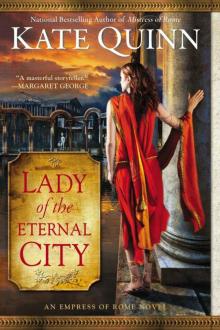 Lady of the Eternal City
Lady of the Eternal City Mistress of Rome
Mistress of Rome Daughters of Rome
Daughters of Rome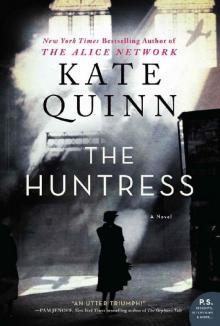 The Huntress
The Huntress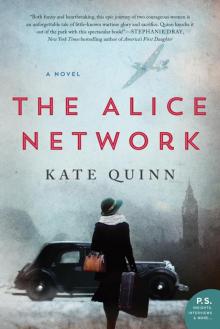 The Alice Network
The Alice Network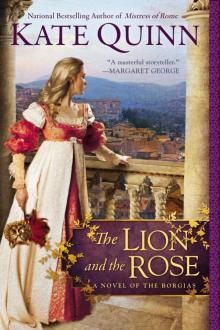 The Lion and the Rose
The Lion and the Rose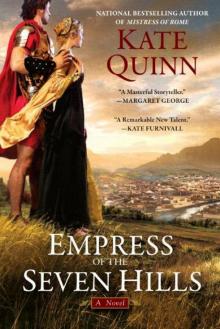 Empress of the Seven Hills
Empress of the Seven Hills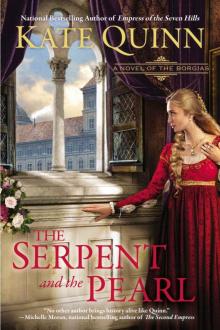 The Serpent and the Pearl
The Serpent and the Pearl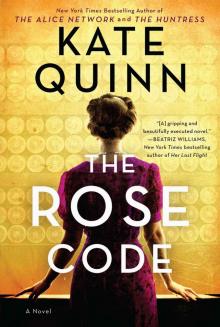 The Rose Code
The Rose Code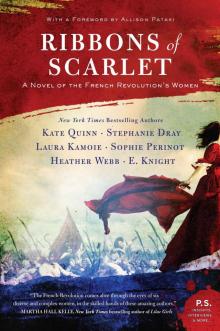 Ribbons of Scarlet
Ribbons of Scarlet A Song of War: a novel of Troy
A Song of War: a novel of Troy